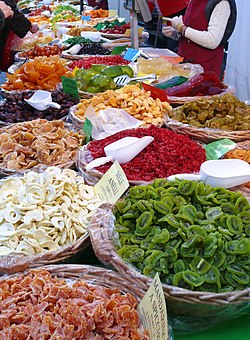Candied fruit
 | |
| Alternative names | crystallised fruit, glacé fruit |
|---|---|
| Type | Confectionery |
| Main ingredients | Fruit or peel, syrup |


Candied fruit is whole fruit, smaller pieces of fruit, or pieces of peel, placed in heated sugar syrup, which absorbs the moisture from within the fruit and eventually preserves it. Depending on the size and type of fruit, this process of preservation can take from several days to several months.[1] This process allows the fruit to retain its quality for up to a year.[2] It has existed since the 14th century.[1]
The continual process of drenching the fruit in syrup causes the fruit to become saturated with sugar, preventing the growth of spoilage microorganisms due to the unfavourable osmotic pressure this creates.[3]
Fruits that are commonly candied include dates, cherries, pineapple, peaches, as well as a root ginger.[4] The principal candied peels are orange and citron; these with candied lemon peel are the usual ingredients of mixed chopped peel (which may also include glacé cherries).
Recipes vary from region to region, but the general principle is to boil the fruit, steep it in increasingly stronger sugar solutions for a number of weeks, and then dry off any remaining water.[5]
Uses[]
Candied fruits such as cherries are commonly used in fruitcakes or pancakes.[citation needed]
See also[]
- Confit
- Maraschino cherry – Preserved, sweetened cherry
- Mostarda – Condiment from Italy made of candied fruit and mustard
- Succade – Candied citrus peel
- Tanghulu – Skewers of glazed fruit (mainly hawthorn)
References[]
- ^ Jump up to: a b "Food, Facts, and Trivia — Candied Fruit". Retrieved 2007-11-22.
- ^ "LA Times - Proper Storage Keeps Candied Fruit Fresh". Retrieved 2016-04-04.
- ^ "Britannica Online Encyclopedia — Candied Fruit". Retrieved 2007-11-23.
- ^ Answers.com (from The Food Lover's Companion) — candied fruit; candied flowers, with candied cherries being popularly referred to as "glacé cherries". Archived on 24 November 20091-06.
- ^ Beckett-Young, Kathleen (1989-12-24). "FARE OF THE COUNTRY; Candied Fruit of Provence: Sweet Tradition". The New York Times. Retrieved 2010-04-28.
- Confectionery
- Food preservation